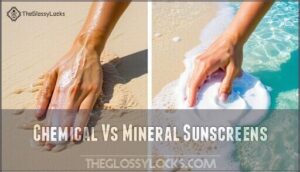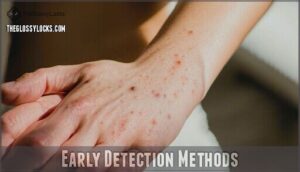This site is supported by our readers. We may earn a commission, at no cost to you, if you purchase through links.

Seek shade during peak UV hours from 10 AM to 4 PM, wear protective clothing and wide-brimmed hats, and avoid tanning beds completely.
Perform monthly self-exams using the ABCDE method to spot suspicious moles: check for Asymmetry, irregular Borders, Color changes, Diameter larger than a pencil eraser, and Evolving features.
Schedule annual dermatologist visits for professional skin checks. These simple habits work together like a shield, dramatically reducing your risk of developing this largely preventable disease that affects over 5 million Americans yearly, and is a significant part of skin cancer prevention.
Table Of Contents
- Key Takeaways
- Skin Cancer Risks
- Preventing Skin Cancer
- Choosing Sunscreen
- Applying Sun Protection
- Reducing Skin Cancer Risk
- Early Detection Methods
- Protecting Specific Skin Types
- Frequently Asked Questions (FAQs)
- How can we avoid skin cancer?
- How can you prevent skin cancer naturally?
- Can a healthy lifestyle prevent skin cancer?
- How to early detect skin cancer?
- Can skin cancer be cured?
- How effective are different types of protective clothing?
- What are common misconceptions about sun protection?
- Are organic sunscreens effective in skin cancer prevention?
- How do air pollutants affect skin cancer risk?
- What role does hydration play in skin protection?
- Conclusion
Key Takeaways
- Apply broad-spectrum SPF 30+ sunscreen daily – Even on cloudy days, UV rays penetrate clouds and reflect off surfaces, so you’ll need consistent protection regardless of weather or season.
- Seek shade during peak UV hours (10 AM-4 PM) – You’ll reduce your exposure to the most intense radiation by planning outdoor activities before or after these dangerous hours.
- Perform monthly self-exams using the ABCDE method – Check for Asymmetry, irregular Borders, Color changes, Diameter larger than a pencil eraser, and Evolving features to catch suspicious changes early.
- Avoid tanning beds completely and wear protective clothing – You’ll dramatically reduce your melanoma risk by choosing UPF-rated clothing, wide-brimmed hats, and skipping artificial UV sources entirely.
Skin Cancer Risks
Your skin faces constant threats from ultraviolet radiation that can accumulate over decades of everyday exposure.
Understanding these hidden dangers—from reflected UV rays bouncing off sidewalks to artificial sources like tanning beds—gives you the power to protect yourself before damage occurs.
UV Radiation Causes
Your skin faces a relentless invisible enemy: UV radiation from the sun.
These harmful rays don’t take breaks—they penetrate clouds, bounce off water and sand, and sneak through car windows during daily activities like commuting or walking the dog.
This constant incidental exposure means you’re collecting sun damage even when you’re not trying to tan, making UV radiation the primary cause of most skin cancers.
Cumulative Sun Exposure
Unlike a single intense sunburn, Lifetime UV Damage builds steadily through daily activities.
Every sunny day adds invisible damage to your skin’s cellular DNA, building toward future cancer risks.
Your skin can’t repair DNA Mutations from years of Incidental Exposure—walking to your car, gardening, or running errands all contribute to Long-Term Effects**.
A good skincare routine includes consistent sun protection to help mitigate these effects.
Childhood Exposure is particularly harmful because:
- Young skin absorbs more UV radiation
- Early sun damage doubles adult skin cancer risk
- Protective habits formed early last lifelong
Artificial UV Sources
Indoor tanning isn’t just risky—it’s downright dangerous.
UV tanning beds and sunlamps blast your skin with concentrated carcinogenic radiation that’s often stronger than natural sunlight.
These artificial UV sources dramatically increase your melanoma risk, with over 3,000 emergency room visits annually from tanning bed burns alone.
Skip the indoor glow and choose safer artificial tanning alternatives like self-tanning products instead.
Skin Cancer Statistics
The numbers paint a sobering picture of America’s most common cancer. You’ll face real risk, but prevention works.
Your skin cancer risk is real, but early action and daily protection can save your life.
- One in five Americans develops skin cancer by age 70
- Over 5 million non-melanoma cases diagnosed annually in the U.S.
- Melanoma causes 90% of skin cancer deaths despite being just 1% of cases
- Early detection boosts five-year survival rates to 99%
- Up to 90% of melanoma cases are preventable through sun safety and early detection
Preventing Skin Cancer
Prevention isn’t just about avoiding sunburn during beach days. Daily habits matter more than you think.
You face UV radiation every time you walk to your car, grab lunch, or pick up groceries. These small exposures add up over decades, making year-round protection your best defense.
Start building habits that shield you from incidental exposure. Wear sunscreen daily, even when clouds cover the sky. UV rays penetrate glass and reflect off concrete, snow, and water. Make sun protection as automatic as brushing your teeth.
| Prevention Strategy | Daily Action |
|---|---|
| Morning routine | Apply sunscreen with breakfast |
| Outdoor activities | Seek shade between 10 AM-4 PM |
| Clothing choices | Wear long sleeves, wide-brimmed hats |
| Avoid artificial UV | Skip tanning beds completely |
| Childhood prevention | Teach kids sun safety early |
Public awareness campaigns emphasize these skin cancer prevention basics because they work. Small changes in sun protection habits reduce skin cancer risks substantially. You don’t need perfection—just consistency.
Choosing Sunscreen
Finding the right sunscreen doesn’t have to feel like solving a chemistry equation—though it does involve a bit of science.
You’ll need to understand three key factors: broad-spectrum protection, SPF levels, and whether chemical or mineral formulas work best for your skin.
Broad-Spectrum Protection
Broad-spectrum sunscreen acts like a shield, protecting your skin from both UVA and UVB rays that cause skin cancer.
UVA protection prevents deep skin damage and premature aging, while UVB protection stops painful sunburns.
Look for sunscreen ingredients like zinc oxide or titanium dioxide for reliable UV protection.
Water resistance keeps your sun protection working during swimming or sweating, making proper application essential for effective skin cancer prevention.
For sensitive skin, consider options with mineral filters are gentler, which can provide a more gentle and effective form of skin protection.
SPF Levels
Understanding SPF efficacy means knowing the numbers behind your sun protection. Higher SPF doesn’t equal exponentially better protection, and SPF myths often mislead consumers about reapplication needs.
Here’s what you need to know about SPF levels:
- SPF 30 blocks 97% of UV rays – meets dermatologist recommendations for daily use
- SPF 50 blocks 98% of UV rays – ideal for extended outdoor activities and fair skin
- SPF 100+ offers minimal additional protection – only blocks 99% of rays, creating false security
- High SPF risks include delayed reapplication – people mistakenly think it lasts longer
- SPF ingredients matter more than numbers – broad-spectrum protection trumps high SPF alone
Choose SPF 30-50 for the best sunburn prevention without overpaying for minimal gains. Many consumers purchase SPF 30 for everyday use.
Chemical Vs Mineral Sunscreens
You’ll find two main types of sunscreen: chemical and mineral. Chemical sunscreens absorb UV rays and convert them to heat, while mineral sunscreens create a physical barrier that reflects rays.
Mineral options with zinc oxide or titanium dioxide work immediately and cause less skin sensitivity. Chemical formulas blend easier but may impact environmental systems.
Many people purchase various sunscreen products online for convenience. Both offer effective broad-spectrum sunscreen protection when applied correctly.
Applying Sun Protection
You’ll need more than just buying sunscreen to protect yourself from skin cancer. The key is applying sun protection correctly and consistently throughout your day.
Seeking Shade
Your safest bet is finding shade structures during peak UV hours from 10 AM to 4 PM.
Natural shade under trees blocks about 75% of UV radiation exposure, while umbrellas and awnings offer solid sun protection.
Consider investing in commercial grade options for superior coverage.
Check the UV Index before heading out—when it hits 3 or higher, shade effectiveness becomes your best friend for sun safety.
Wearing Protective Clothing
Your clothing acts like a personal shield against harmful UV rays.
Look for sun-protective clothing with UPF ratings of 30 or higher – fabric matters more than you think.
Long-sleeved sun shirts and pants provide better clothing coverage than shorts and tank tops.
Wide-brimmed sun hats protect your face, neck, and ears.
One strategy is to think about UPF-rated hiking apparel for maximum coverage.
Style choices don’t have to sacrifice protection, and affordability options exist for every budget.
Applying Sunscreen Correctly
Beyond protective clothing, proper sunscreen application becomes your skin’s frontline defense against harmful UV rays.
You can’t just slap it on and hope for the best.
Here’s how to get sunscreen right:
- Apply one full ounce (shot glass amount) to cover your entire body 15-30 minutes before heading outside
- Don’t skip common missed spots like ears, feet, eyelids, and the back of your neck where burns hurt most
- Check expiration dates because expired sunscreen loses its sun protection factor SPF effectiveness
- Choose broad-spectrum sunscreen with SPF 30 or higher for reliable protection against both UVA and UVB rays
Water-resistant sunscreen works best for active days, but no formula lasts forever on your skin.
Reapplying Sunscreen
Most people apply sunscreen once and forget about it—big mistake.
You’ll need to reapply every two hours for continuous protection, or immediately after swimming or sweating.
Water-resistant sunscreen isn’t waterproof, so post-activity reapplication remains critical.
Set phone reminders to overcome application challenges and maintain consistent sun protection throughout your day outdoors, ensuring continuous protection.
Reducing Skin Cancer Risk
Beyond basic sun protection, you’ll need to address specific risk factors that substantially increase your skin cancer chances.
Taking action against tanning beds, childhood sun damage, genetic predisposition, and harmful chemical exposure creates a thorough defense strategy that goes far beyond daily sunscreen use, forming a thorough defense strategy.
Avoiding Tanning Beds
The allure of a golden glow can’t mask the harsh reality: tanning beds emit concentrated UV radiation that’s proven carcinogenic.
Indoor tanning accidents send over 3,000 people to emergency rooms annually, while artificial UV effects increase melanoma risk dramatically.
Teen tanning risks are particularly severe since early exposure compounds lifetime danger.
Despite tanning addiction affecting many users, avoid tanning beds completely—your future self will thank you.
Reducing Childhood Sunburns
Protecting children from childhood sunburns starts early – even newborns need Infant Sun Protection through shade and clothing since sunscreen isn’t recommended until six months.
School Sun Safety programs teach kids proper sun habits, while Parental Education helps families create Playtime Shade during peak hours.
Keep Sunburn First Aid supplies handy for minor burns, but prevention beats treatment every time.
Managing Family History
Genetics doesn’t determine your destiny, but it does stack the deck. If your family tree includes skin cancer survivors, you’ll need extra vigilance and proactive prevention strategies.
Your dermatologist visits should include these discussions:
- Genetic predisposition assessment – Review your complete family medical history
- Familial melanoma patterns – Identify hereditary cancer syndromes
- Screening recommendations – Establish personalized check-up schedules
- Risk assessment protocols – Monitor suspicious moles more frequently
Knowledge empowers better skin cancer prevention strategies.
Avoiding Chemicals
Chemical sensitivities affect millions, making ingredient research essential for sun protection habits.
Switch to organic sunscreen with zinc oxide or titanium dioxide for natural alternatives that won’t trigger reactions.
These mineral-based options provide excellent UV radiation protection without toxin exposure.
Seek shade when possible and combine sun protection measures for complete defense against harmful rays using natural alternatives.
Early Detection Methods
Early detection can catch skin cancer when it’s most treatable, potentially saving your life.
You’ll need to perform monthly self-exams and schedule regular dermatologist visits to spot suspicious changes before they become serious problems.
Performing Self-Exams
Regular skin self-exams help you spot mole changes before they become serious problems.
Check your entire body monthly in good lighting, using mirrors to examine hard-to-see areas like your back and scalp.
Take photos to track suspicious spots over time – this body mapping approach makes it easier to notice changes.
Schedule a doctor consult if you discover anything unusual during your skin examination, which can help identify potential issues before they become serious.
Using The ABCDE Guide
Remember the ABCDE acronym when examining moles during skin self-exams.
Check for Asymmetry explained as uneven halves, Border irregularity with jagged edges, Color variations within one mole, Diameter evolution exceeding pencil eraser size, and Evolving changes over time.
This systematic approach helps identify concerning mole changes that warrant immediate dermatologist consultation for professional skin examination and early detection of skin changes.
Identifying Skin Cancer Warning Signs
Beyond obvious changes like mole growth or new spots, watch for subtle skin cancer symptoms that develop gradually.
Asymmetry check reveals when one half of a mole doesn’t match the other, while border irregularity shows jagged or blurred edges.
Color variation within a single spot signals potential trouble, making regular skin self-exams essential for early detection and successful treatment outcomes, which can lead to better successful treatment.
Regular Skin Check-Ups
While self-exams help you spot changes, professional dermatologist visits provide expert screening you can’t replicate at home.
Schedule annual skin cancer screenings, or more frequently if you have risk factors. Dermatologists use specialized tools and training for thorough mole checks that catch early-stage cancers.
Telehealth options now make dermatological exams more accessible, ensuring frequency matters for effective skin cancer detection. Consistent habits such as daily SPF protection are also essential for overall skin health, and it’s crucial to make them a consistent habit.
Protecting Specific Skin Types
Your skin type determines how vulnerable you’re to UV damage, but everyone needs protection regardless of their natural pigmentation.
Understanding your specific risk factors helps you choose the most effective prevention strategies for your unique skin characteristics, and knowing your skin type is crucial for effective prevention.
Fair Skin Protection
If you have fair skin, your genetic predisposition puts you at higher risk for severe sunburns due to melanin deficiency. Childhood exposure substantially increases skin cancer risk factors throughout life.
Essential protection steps:
- Apply SPF 30+ sunscreen daily, even indoors near windows
- Seek shade between 10 AM-4 PM when UV radiation dangers peak
- Wear wide-brimmed hats and UV-protective clothing outdoors
- Reapply sunscreen every two hours for effective sunburn prevention
- Consider vitamin D supplements instead of unprotected sun exposure for effective sunburn prevention
Dark Skin Protection
Darker phototypes don’t eliminate skin cancer risk despite melanin myths suggesting otherwise.
You’ll still need sunscreen use with SPF 30+ daily since melanin provides only about SPF 13 protection.
Late detection remains a major concern as melanoma often appears on palms, soles, and under nails rather than sun-exposed areas.
Pigmentation changes and new dark spots warrant immediate dermatological evaluation to guarantee equitable access to early treatment and better outcomes.
Notably, early detection is vital for successful treatment.
Sensitive Skin Protection
If you have sensitive skin, gentle sunscreens with mineral ingredients work best for skin cancer prevention tips.
Choose hypoallergenic clothing that won’t irritate while providing sun protection for kids and adults.
Apply soothing aftercare products with barrier repair ingredients after sun exposure.
These pediatric protection strategies and sunscreen use methods help maintain healthy skin without triggering reactions, using hypoallergenic clothing.
Skin Conditions Protection
Chronic conditions like eczema protection, psoriasis defense, and rosacea management require extra UV radiation vigilance since inflammation increases skin cancer prevention challenges.
You’ll need SPF 50+ mineral sunscreens for sensitive areas, plus UPF clothing when topical products irritate.
Acne prevention routines shouldn’t skip sunburn protection—your dermatologist can recommend compatible products for thorough wound care and skin cancer awareness.
Frequently Asked Questions (FAQs)
How can we avoid skin cancer?
Prevention is better than cure" – protect your skin by seeking shade between 10 AM-4 PM.
Wearing broad-spectrum SPF 30+ sunscreen daily, covering up with protective clothing and wide-brimmed hats, is essential for skin protection.
Avoiding tanning beds completely is also crucial to prevent skin damage.
How can you prevent skin cancer naturally?
You can prevent skin cancer naturally by seeking shade during peak UV hours, wearing protective clothing and wide-brimmed hats.
Avoiding tanning beds completely is also crucial, while staying consistent with daily prevention habits, which includes all the mentioned methods to ensure complete prevention of skin cancer.
Can a healthy lifestyle prevent skin cancer?
While you can’t completely dodge skin cancer through lifestyle alone, you’re stacking the deck in your favor.
A healthy diet rich in antioxidants, regular exercise, and avoiding smoking support your skin’s natural defenses against UV damage.
How to early detect skin cancer?
Regular self-exams help you spot new moles or changes in existing ones.
Check your skin monthly, looking for asymmetry, irregular borders, color variations, diameter changes, or evolving characteristics—the ABCDE warning signs.
Can skin cancer be cured?
Yes, skin cancer can often be cured, especially when you catch it early.
Treatment success rates are excellent for most types, with basal and squamous cell carcinomas having cure rates exceeding 95% when detected promptly.
How effective are different types of protective clothing?
Ironically, you might think a simple T-shirt shields you from cancer, but tight-weave fabrics, long sleeves, and UPF-rated clothing provide real protection. Wide-brimmed hats beat baseball caps hands down.
What are common misconceptions about sun protection?
Many people mistakenly believe clouds block UV rays, but they don’t provide complete protection.
You might think a "base tan" protects you, but it’s actually skin damage signaling increased cancer risk.
Are organic sunscreens effective in skin cancer prevention?
Organic sunscreens contain mineral ingredients like zinc oxide and titanium dioxide that effectively block UV rays. They’re just as protective as chemical sunscreens when you apply them properly and consistently.
How do air pollutants affect skin cancer risk?
Air pollutants create a paradox.
They contribute to skin aging, atopic dermatitis, acne, psoriasis, hair loss, and skin cancer through oxidative stress and inflammation.
Yet might reduce melanoma risk by blocking UV rays.
What role does hydration play in skin protection?
While dehydrated skin becomes brittle and vulnerable, well-hydrated skin maintains its protective barrier.
You’ll strengthen your natural defense system by drinking water and using moisturizers regularly, helping your skin resist UV damage more effectively, which is crucial for maintaining well-hydrated skin.
Conclusion
Building healthy habits today shields you from tomorrow’s regret.
These seven proven steps for how to prevent skin cancer aren’t just medical recommendations—they’re your daily armor against a preventable disease.
Think sunscreen as your morning coffee routine, shade-seeking as your midday ritual, and monthly self-exams as your personal health check-in.
You’ve got the knowledge, the tools, and the power to protect your skin for decades ahead.
- https://www.aamc.org/news/why-are-so-many-black-patients-dying-skin-cancer
- https://www.cuimc.columbia.edu/news/skin-cancer-people-color
- https://www.cancer.org/cancer/latest-news/what-people-of-color-need-to-know-about-sun-protection-and-skin-cancer.html
- https://pmc.ncbi.nlm.nih.gov/articles/PMC2671032/
- https://www.cancer.gov/types/skin/skin-cancer-in-black-or-brown-skin














